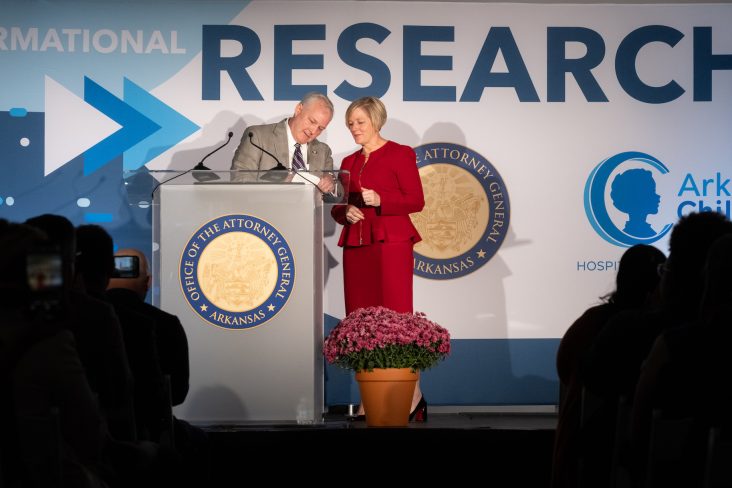$50 million AG grant funding Arkansas Children’s opioid research center
by November 9, 2023 12:44 pm 780 views

A $50 million grant using national opioid settlement funds by Attorney General Tim Griffin will allow Arkansas Children’s Hospital to build the $70 million National Center for Opioid Research & Clinical Effectiveness (NCOR) on the hospital’s campus in Little Rock.
Griffin along with Children’s CEO Marcy Doderer announced the center and the grant at an event in front of the Arkansas Children’s Research Institute Thursday (Nov. 9). The Institute will add an initial investment of more than $20 million. Scientists will work closely with the Institute and Arkansas Children’s Nutrition Center.
Construction on the 45,000-square-foot facility is expected to begin in late 2024. Griffin emphasized that NCOR will have its own building and research mission.
“If you’re doing it where you’re doing the other research, you’re not serious,” he said.
Arkansas Children’s Chief Clinical Officer Rick Barr, MD, said the investment will let the hospital leverage its current expertise and recruit new team members to build an infrastructure to address the opioid epidemic’s impact on children in Arkansas and across the country.
Barr said NCOR would include a nationally recognized brain imaging center, a clinical research unit, analytics expertise and telehealth capabilities. It will lead research regarding improving detection and treatment of opioid exposure in children, and in creating community engagement models for preventing use by adolescents.
It will eventually conduct studies to asses the impact of prenatal and neonatal exposure on developmental and behavioral outcomes. Brain imaging technology will let researchers study what parts of the brain are involved so they can design prevention methods and therapies, a hospital press release said. Arkansas Children’s will refine techniques to quickly detect opioids, including newer synthetic opioids that can go undetected.
Dr. Pete Mourani, who leads the Arkansas Children’s Research Institute, and Dr. William Steinbach will lead the national effort to find NCOR’s inaugural director, according to a press release from Griffin’s office.
Griffin’s office received $140 million before attorneys’ fees in settlement money to be spent on opioid abatement efforts only.
Griffin said he started thinking about the settlement before he took office and wanted to have a process for disbursing the money. While he would make smaller grants such as one awarded the day previously to law enforcement entities for NARCAN overdose rescue kits, he wanted to make a long-term infrastructure investment.
“What we’re doing today will impact Arkansas and ultimately the world after we’re all gone,” he said.
He said he contacted Doderer while she was on vacation saying he wanted to talk to her about pediatric opioids. When she returned, he asked her to create a proposal and think big. The initial proposal was for $10 million for research. He told her that merely would fund a project using existing infrastructure, not something longer lasting, and that he wanted to build a building. He emphasized the importance of its being branded as a national effort that would allow it to stand alone and receive federal grants.
“If no one else is doing this in the country, we need to get a flag, and we need to put it in the ground, and we need to be national, and we need to say we’re national,” he said.
Doderer came back with the $70 million proposal, and he committed $50 million. He said being national would be what the Army calls a “force multiplier” that will enable it to obtain grants and own the space.
Griffin and Doderer both said the opioid epidemic has not peaked. Griffin noted that the epidemic’s pathway from prescription to illicit drugs will only make it worse.
Cities through the Arkansas Municipal League also received $140 million in settlement money, as did counties through the Association of Arkansas Counties through separate suits. Those two entities have created a partnership to disburse the money.
